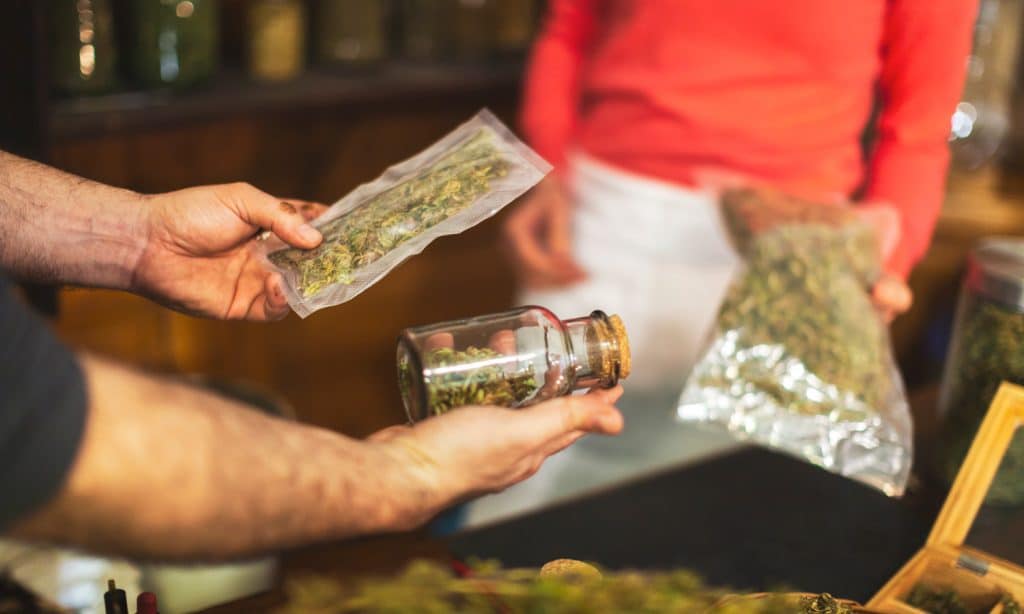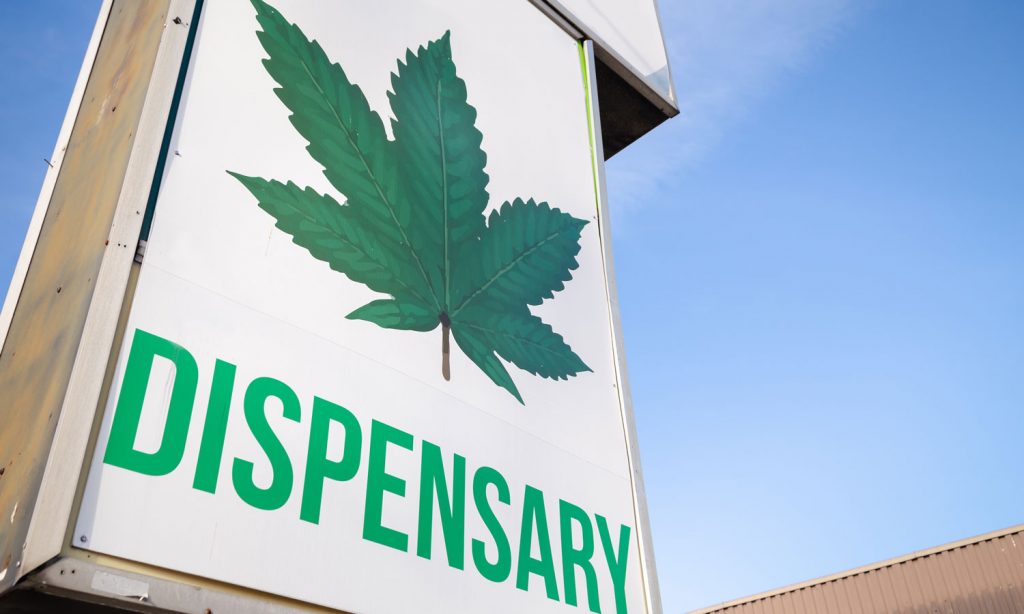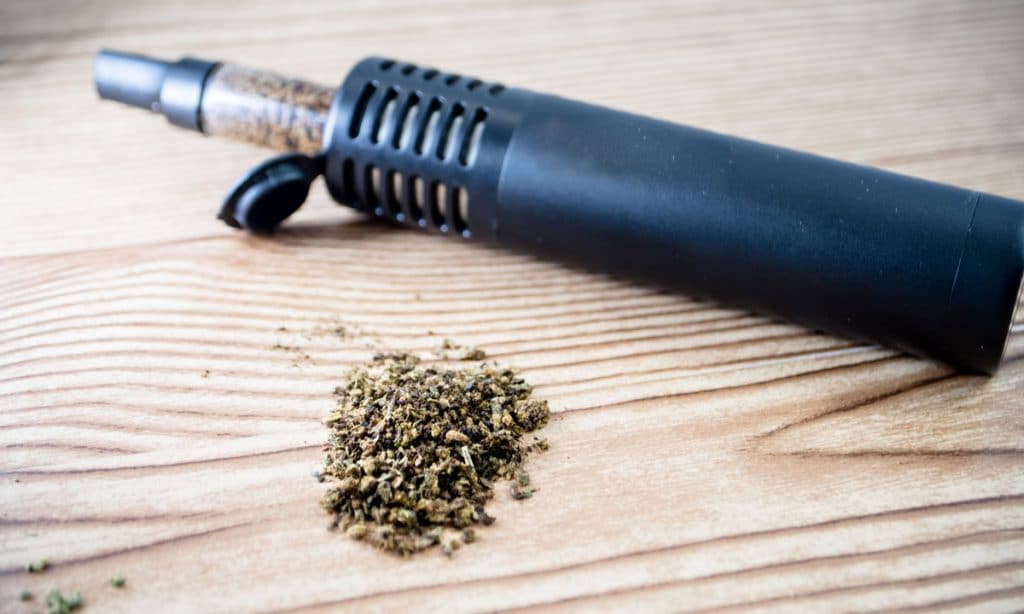In the first few days of the four-month ban on all vaping products in Massachusetts, Laura Lee Medeiros, a medical marijuana patient, began to worry.
An employee puts down an eighth of an ounce marijuana after letting a customer smell it outside the Magnolia cannabis lounge in Oakland, California, U.S. April 20, 2018.
The 32-year-old massage therapist has a diagnosis of post-traumatic stress disorder (PTSD) from childhood trauma. To temper her unpredictable panic attacks, she relied on a vape pen and cartridges filled with the marijuana derivatives THC and CBD from state dispensaries.
There are other ways to get the desired effect from marijuana, and patients have filled dispensaries across the state in recent days to ask about edible or smokeable forms. But Medeiros has come to depend on her battery-powered pen, and wondered how she would cope without her usual supply of cartridges.
“In the midst of something where I’m on the floor, on the verge of passing out, my pen has been very helpful for me to grab,” she said. She carries her vape pen in her purse in case of an emergency, but has only one cartridge left.
Massachusetts imposed its ban on all vaping products, including both nicotine- and cannabis-based products, in response to mounting concern about the potential serious health risks. Governor Charlie Baker, a Republican, said the ban would last at least four months while new legislation and regulation is explored.
More than 800 cases of a vaping-related lung disease and 12 deaths across 10 U.S. states have so far been reported by the U.S. Centers for Disease Control and Prevention. Those numbers are expected to climb.
More than three quarters of those with the respiratory illness reported vaping THC, the main psychoactive ingredient of marijuana. Many of them used small e-cigarette cartridges, or “carts,” bought on the black market, where the risk of adulterated products is high.
Marijuana remains illegal under federal law, but a growing number of states allow it for medical or recreational use. Massachusetts is one of 10 U.S. states that allows both uses, along with the District of Columbia.
Some marijuana users had long eschewed vaping even before the ban, often on the advice of doctors who saw the cocktail of compounds being inhaled into lungs as risky.
“I have advised against the vape carts for my patients for a long time exactly out of suspicion of basically what just happened,” said Dr. Ryan Zaklin, a doctor in Salem, Massachusetts. “Who the hell knows what they’re putting in them?”
Some patients like vaping because it is more discreet than traditional burning of marijuana “flower.” The devices are small, produce a relatively odorless “vapor” and is fast-acting: a handheld device rapidly heats liquid compounds into an aerosol that can be inhaled into the lungs.
Many of those patients are now asking their doctors or dispensaries about edible forms of marijuana, liquid tinctures that can be dropped under the tongue or old-fashioned flower buds and pre-rolled joints for smoking.
For Medeiros, who lives in the small coastal city of Peabody, other methods are a poor substitute. She found that edibles take time to take effect, typically about an hour. Tinctures seemed to her similarly slow-acting. And rolling a joint while her vision is closing in and she is hyperventilating from a panic attack is nearly impossible, she said.
UNEXPECTED BLESSING
Medeiros wishes medical marijuana patients had been given time to stock up on the products they use before the ban went into immediate effect.
Pressed on such concerns, the governor has not been swayed to change his decision over what he said was a public health emergency.
“There are many alternative uses available to people who currently have prescriptions for medical marijuana and they should pursue those,” Baker told reporters last week, according to local media.
But some public health experts have warned the ban may drive more people toward riskier black-market, totally unregulated vape products.
At the New England Treatment Access (NETA) dispensary in Brookline, near Boston, which has become one of the biggest suppliers of medical marijuana since the drug became legalized in the state in 2012, several patients said they view the ban as an unexpected blessing.
Denise Sullivan, 62, uses medical marijuana to treat symptoms of her leukemia. She had vaped for more than a year, but stopped after she heard about the ban. During the period she vaped, she contracted pneumonia five times, she said, and now believes that might have been vape related.
“I can tell when I vape I am more congested not in my lungs but in my sinuses,” she said. She plans to use edibles, which she said kick in with enough time to treat her pain.
Kate LeDoux, 49, had a similar experience. She is a runner and used medical marijuana to help recovery from recent foot surgery. LeDoux stopped vaping a few weeks ago after seeing the news about the lung disease, turning instead to edibles and smoking.
Almost immediately, her “weird cough” cleared up and her running times improved, she said. “Now I know it was 100 percent the vaping.”



